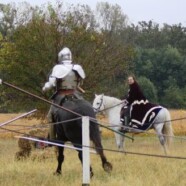
This summer I was a guest instructor at Odyssey (![]() odysseyworkshop), where I focused on the role of sidekicks as part of an overall discussion of characterization. The first half of the lecture was posted as a podcast last month, and they’ve just made the second half available on their website here.
odysseyworkshop), where I focused on the role of sidekicks as part of an overall discussion of characterization. The first half of the lecture was posted as a podcast last month, and they’ve just made the second half available on their website here.
Podcast #32: In this podcast, the second of two parts, Patricia Bray explains how the sidekick’s characteristics can balance those of the protagonist, or contrast with those of the protagonist. She discusses the requirements for a good sidekick, and describes how the sidekick’s character arc can complement or contrast with the protagonist’s character arc. She explains the difference between a sidekick/protagonist story and a story with multiple protagonists. She also lists some of the very useful purposes a sidekick can serve in a story, such as making your protagonist more believable, providing an embodiment of the protagonist’s motivation, and serving as the external conscience of protagonist. She also reviews the various mistakes an author can make in creating a sidekick. Patricia discusses sidekicks in short stories as well as novels, and explains when you might want to use the sidekick’s point of view. You can find part 1 of Patricia’s discussion of sidekicks in Podcast #31.
One Comment
Leave a Reply
You must be logged in to post a comment.


I always fieugrd the big edge to young sidekicks is that it gave young readers someone to identify with. Any kid could imagine himself in Robin’s pointy shoes and fighting alongside Batman or as the Rick Jones to some Hulking character, while only older readers would associate with older characters. If not for the sidekick role, how would a kid get to know someone like Captain America and imagine himself ultimately taking the hero’s place? This allows the hero to take on the role of mentor or even father-figure to a reader who wants that in his own life. That’s why Spider-man didn’t have a sidekick: He was already young enough for young readers to sympathize with him, and he aged in accords with the comic-reading audience (not counting that god-awful Reign storyline, man that was awful). He’ll never be replaced (except for that god-awful Clone Saga storyline, which ended up putting him back in the role anyway). And no matter what else happens, his wisecracks shows he’ll always be too immature to be a real father-figure and too independent to be a mentor.